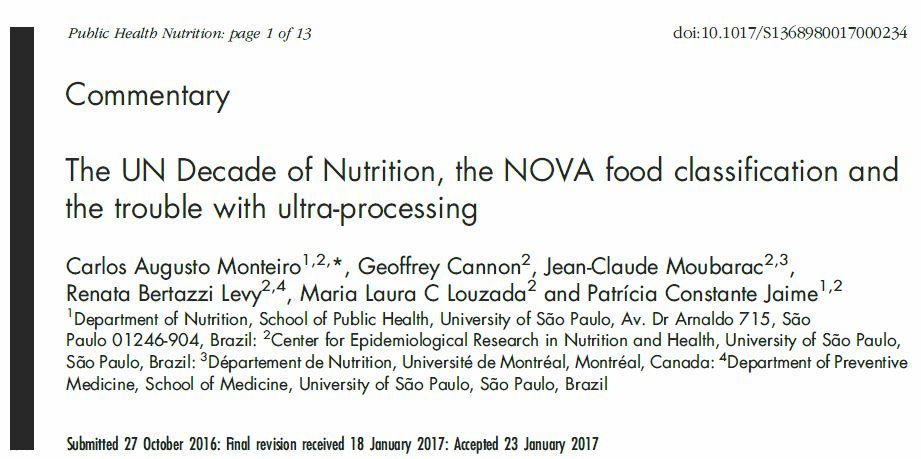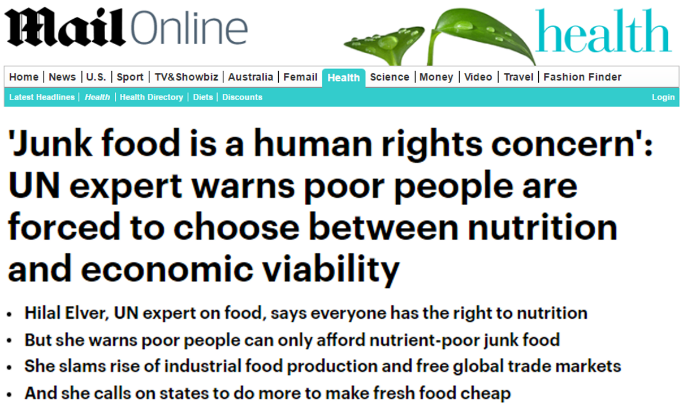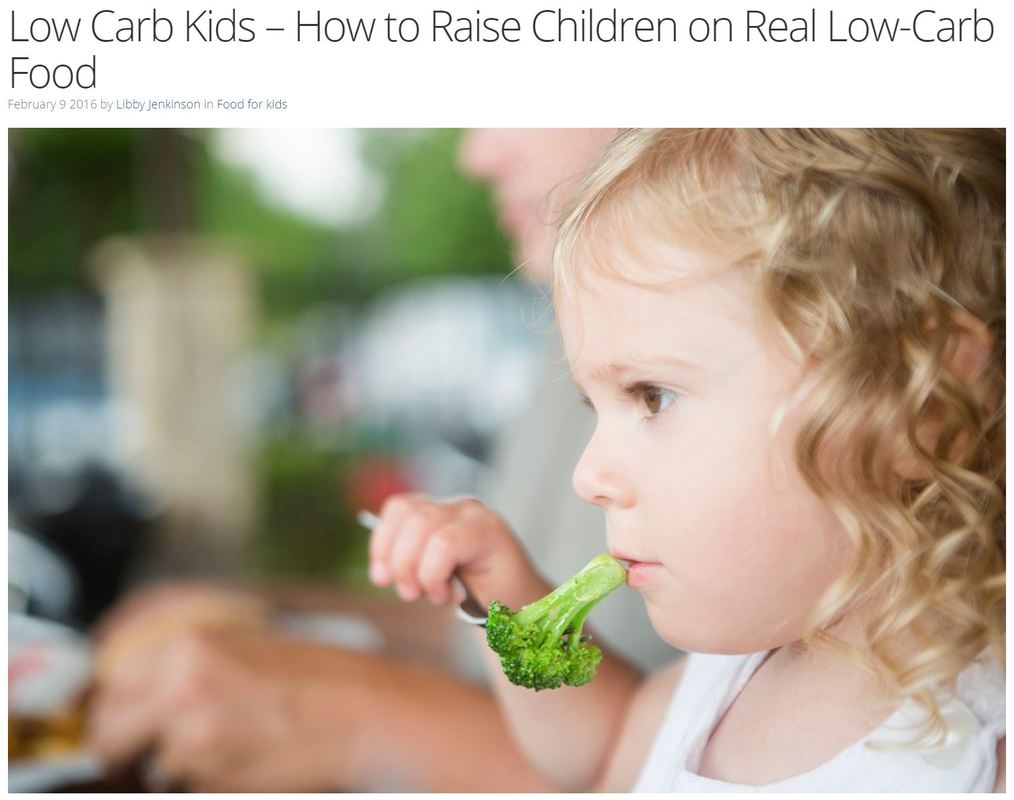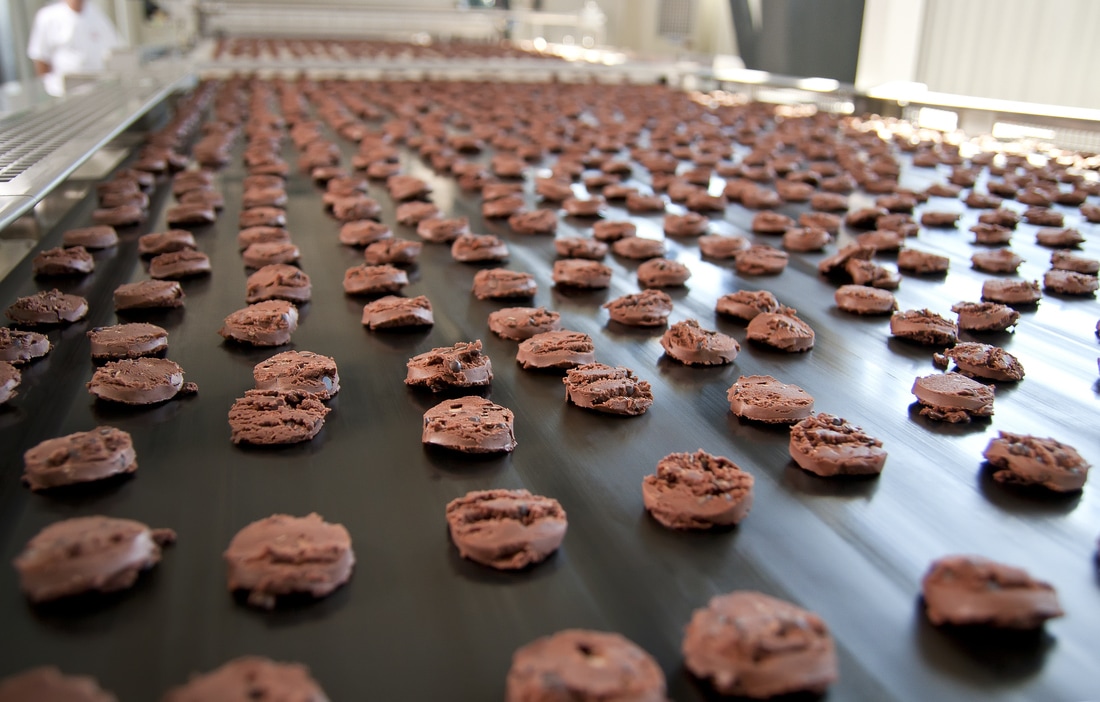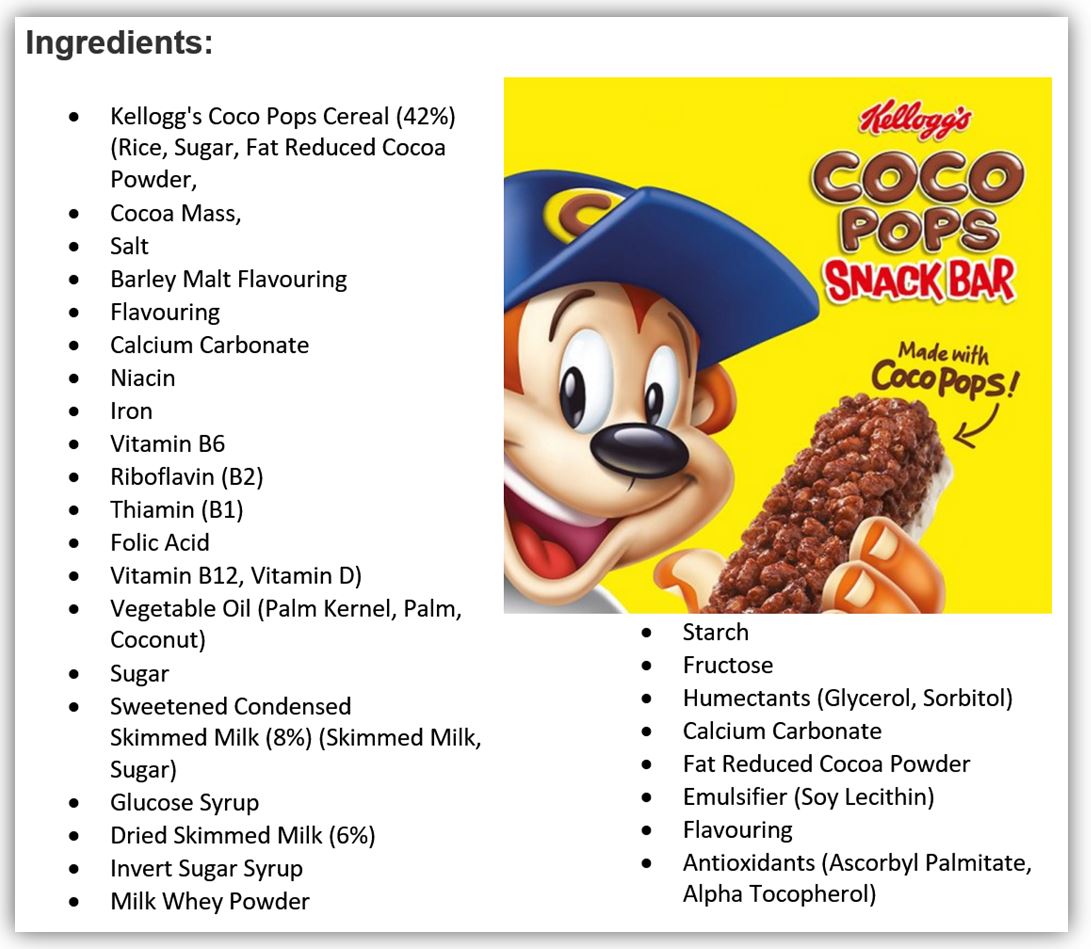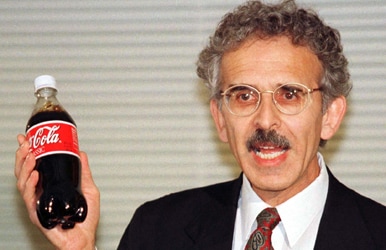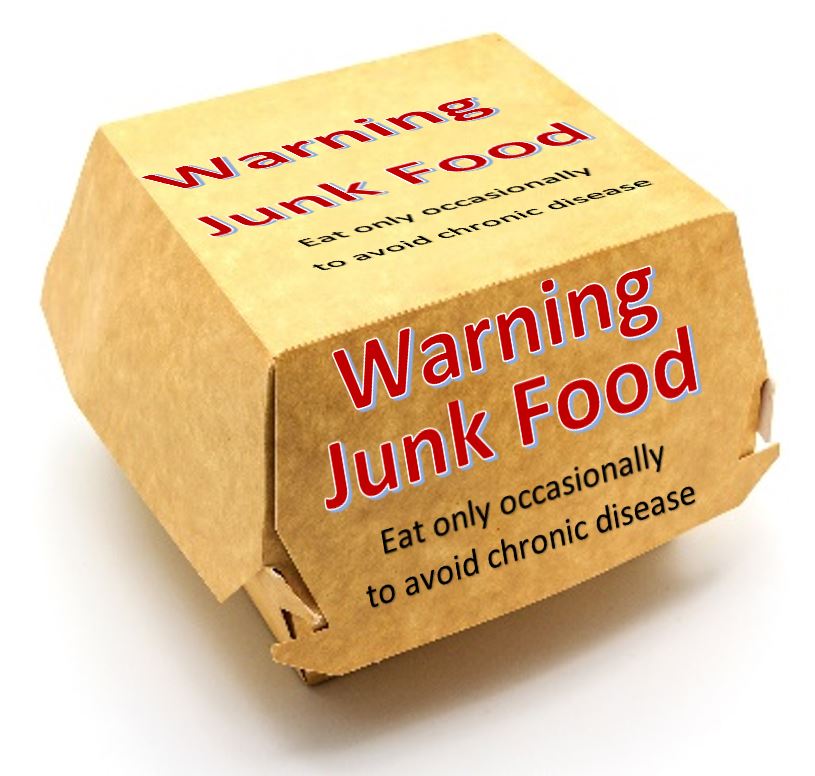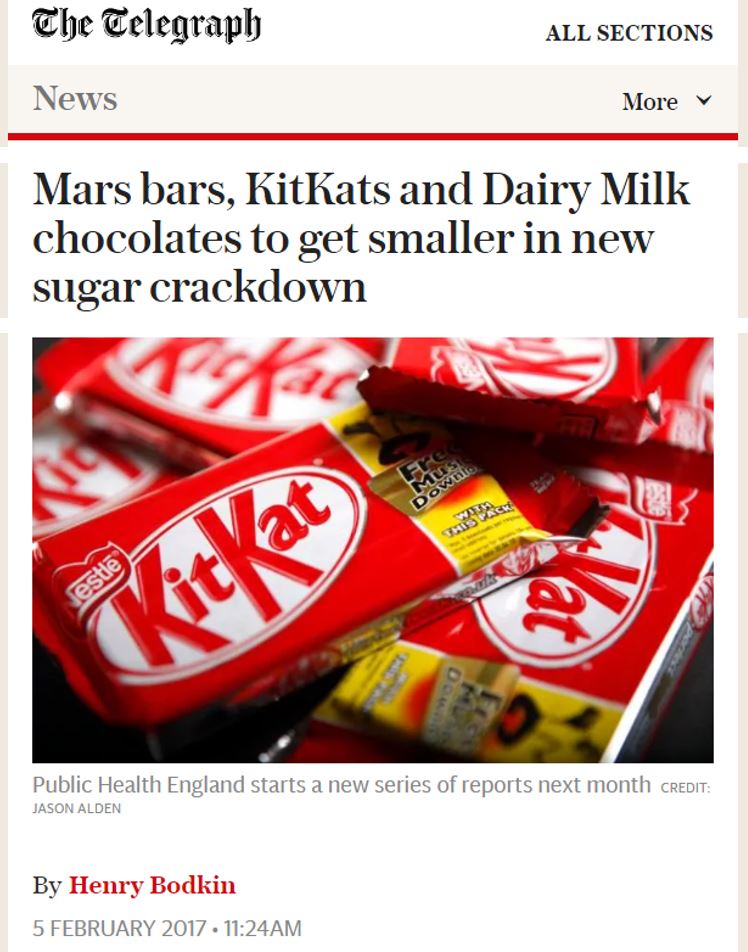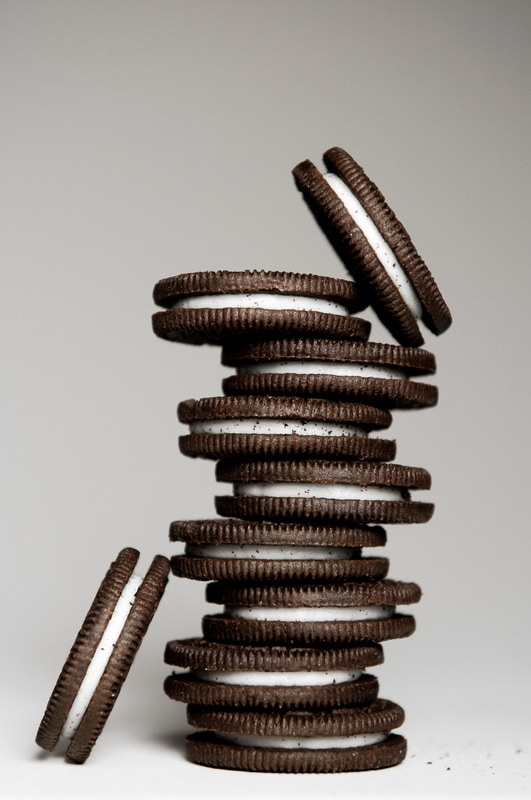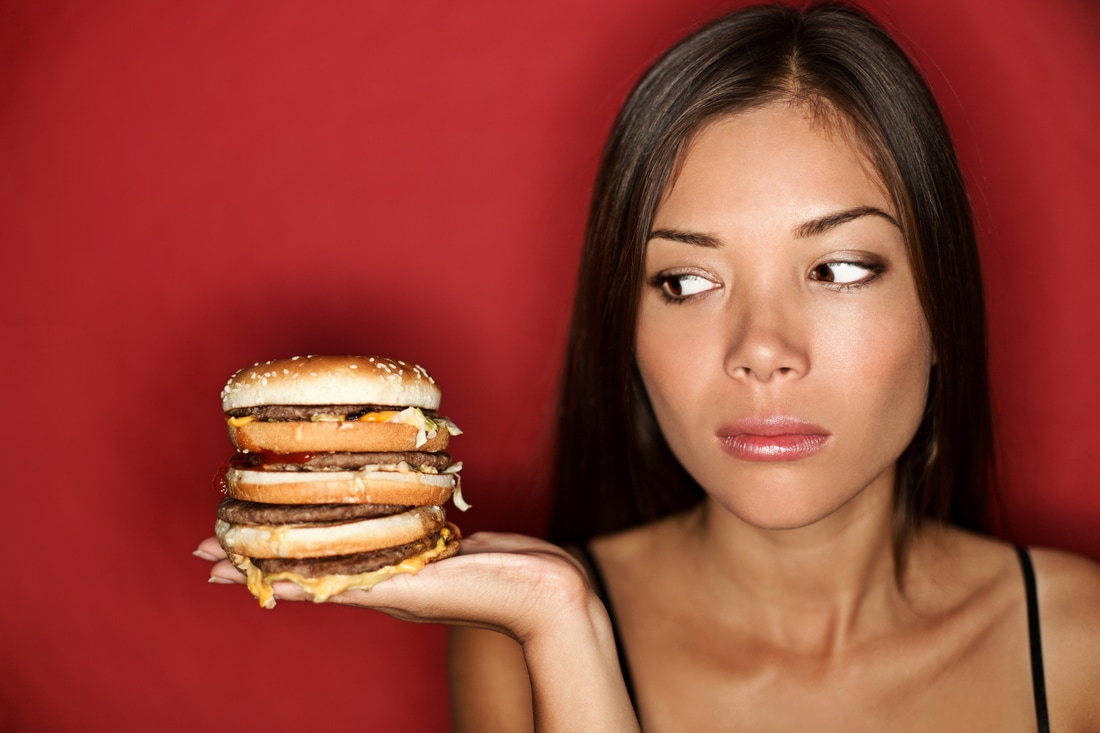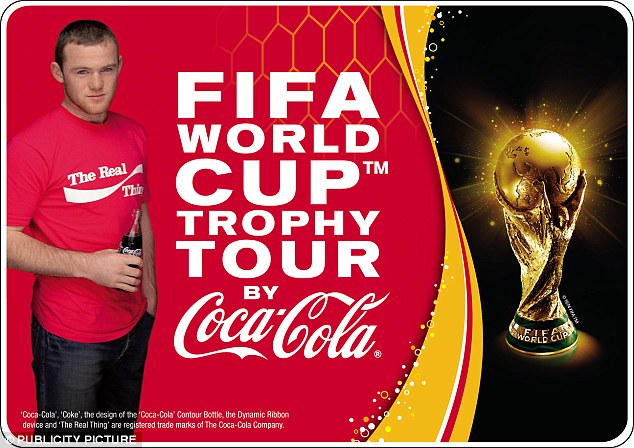Big Food wants to keep the Junk Food focus on fat, sugar, salt and calories; that doesn't make it right.In announcing the Decade of Action on Nutrition on April 1st 2016, The United Nations acknowledged a stark polarization which is becoming even more marked as the years progress. Although there are 800 million people who remain chronically undernourished at one end of the spectrum, at the other end are another 600 million who are obese. Those at both ends suffer from malnutrition; they are just different forms of the same condition. The UN resolution places nutrition firmly at the heart of sustainable development for the future and reviews at length how malnutrition affects both groups of unfortunate global citizens. As WHO Director-General Dr Margaret Chan says:
|
The Big Read |
Part of the world has too little to eat, leaving millions vulnerable to death or disease caused by nutrient deficiencies. Another part overeats, with widespread obesity pushing life-expectancy figures backwards and the costs of health care to astronomical heights.
In my words: ‘Mal’-nutrition now refers to both those who have insufficient food and to those who eat too much poor quality food - in everyday terms, those that eat too much junk food.
|
The original Rome Declaration dated November 19th 2014 which kicked off this initiative attacked the usual macro and micro-nutrient suspects. “Governments” it said in the declaration, “should encourage a reduction in trans-fats, saturated fats, sugars and salt in foods and drinks, and improve the nutrient content of foods through regulatory and voluntary instruments”. No surprises there, but the proceedings then took a dramatic turn.
Drawing on a paper first published in Obesity Reviews and dated October 23rd 2013 entitled “Ultra-processed products are becoming dominant in the global food system”, the UN decided to adopt a definition for these ultra-processed foods (UPPs) which effectively short-circuited the macro/micro-nutrient conversation. By declaring that these ‘UPPs’ and their related supply chains have an impact on both ends of the food availability spectrum, they became the core focus for future policies and programs. The problems of ultra-processed food were first raised by Carlos Monteiro (Professor at the Department of Nutrition of the School of Public Health at the University of São Paulo) in a 2009 paper entitled “Nutrition and health. The issue is not food, nor nutrients, so much as processing”. But potential progress using these considerations has really only come to life with the widespread adoption of the NOVA food classification system by bodies such as the Pan American Health Organization and the UN Food and Agriculture Organization. |
Ultra-processed foods are: "formulations mostly of cheap industrial sources of dietary energy and nutrients plus additives, using a series of processes". They are also:
|
NOVA - the trouble with ultra-processingIn their paper, “The UN Decade of Nutrition, the NOVA food classification and the trouble with ultra-processing”, the authors show that displacement of minimally processed foods and freshly prepared dishes and meals by ultra-processed products is associated with unhealthy dietary nutrient profiles and several diet-related non-communicable diseases (my bold).
Anna Lartey, Director of the Nutrition Division of The Food and Agriculture Organization of the United Nations (FAO), provided guidance in 2015 to countries and researchers on how to incorporate the collection of information on processed foods into their food consumption surveys. Contributors to these guidelines included some heavyweights such as Walter Willett of the Harvard School of Public Health in Boston and the resulting NOVA classification now effectively divides food and drink into four categories.
So when in October 2016, Hilal Elver, the UN’s special representative on the right to food was quoted in newspaper headlines such as this from the Daily Mail saying - “'Junk food is a human rights concern': UN expert warns”; it looked to me as if we were finally connecting the dots. Cementing the link between two ends of a circle that each defined junk food simply as ‘Ultra-processed food and drink products’, no matter from which position you approached the issue. |
|
How wrong I was. And would that it were so simple. Ms Elver never referenced 'junk food'. It turns out that what Ms Elver actually spoke about was ‘cheap, nutrient-poor foods’ when she raised the topic of the basic ‘human right to adequate food’. Those false newspaper references to junk food were courtesy of the Associated Press reporter covering the press conference who, with the best of intentions, was probably just trying to simplify things for us lay people.
Yet according to the Washington Post, most people - roughly six in 10 - acknowledge that they only ever read the news headlines, not the specifics. So anyone reading those headlines, whether in the Washington post or the Daily Mail, probably really did think that the UN was finally getting tough on purveyors of junk food.
And therein lies the problem. Junk food is a catch-all phrase that means quite different things to different people. And Big Food is desperate to keep it that way; to keep the focus away from the topic of ultra-processing. That represents after all, by far their most profitable ‘added-value’ segment and all their complex global supply chains, sales and distribution systems are set up to optimize 'ultra-processed' efficiency.
Yet according to the Washington Post, most people - roughly six in 10 - acknowledge that they only ever read the news headlines, not the specifics. So anyone reading those headlines, whether in the Washington post or the Daily Mail, probably really did think that the UN was finally getting tough on purveyors of junk food.
And therein lies the problem. Junk food is a catch-all phrase that means quite different things to different people. And Big Food is desperate to keep it that way; to keep the focus away from the topic of ultra-processing. That represents after all, by far their most profitable ‘added-value’ segment and all their complex global supply chains, sales and distribution systems are set up to optimize 'ultra-processed' efficiency.
So what is Junk Food?
|
There’s a popular parlour game which involves someone giving you a word and then asking you to say the first thing that comes to mind; the next person continues and so on. Let's play: Imagine for a moment that you are looking at a cake shop window, or maybe the Starbucks counter full of buns, biscuits and chocolate cake. Someone says out loud the words ‘junk food’. Is your immediate response ‘blueberry scone’ or do you perhaps mention a favourite slice of cake? Or do you mentally leave the cake shop window and jump straight to a more mainstream understanding of junk food and say ‘pizza’ or perhaps, ‘burger’?
Having tried this little game with a number of willing participants, it is quite likely that you did initially think of something fatty instead of selecting from what your mind conjured up in the café window. You may well have thought of those sweet cakes and pastries as simple treats, even part of a welcome break in the middle of a busy day ...not really qualifying as your idea of ‘junk food’ at all. Yet I would argue that pretty much everything on display in the café or cake shop counter is quite definitely, without a doubt, junk food; being heavy in sugar and other highly processed carbohydrates as well as cheap oils. Most of us probably do first associate junk food with pizzas, hamburgers and hot dogs. We might also refer to such items as fast-food. Related thought patterns might even lead us to consider the possible damage we are doing to our arteries when eating all that saturated fat, salt and processed meat. After all, that’s what we’ve been told haven’t we? We could of course be considering just how tasty junk food can be; that is how such produce is conceived, developed and designed to be, with the appropriate flavour additives and emulsifiers also guaranteeing a perfect consistency. Even so, most of us would probably still be thinking of different food categories to cakes and buns… chocolate bars maybe or biscuits? Are they junk food too? Does Nutella with its 57 per cent level of sugar content fall into the junk food category or does it all depend on with what you eat it ? Celery Nutella dips are OK ...maybe? At this point, let me suggest that we simplify our lives; that we call all ultra-processed food and drink exactly what it is - junk food. "A formulation, mostly of cheap industrial sources of dietary energy and nutrients plus additives", as the UN report says. But 'junk food' has a memorable ring to it that Ultra-Processed Produce (UPPs) certainly does not have. We would of course need to define UPP’s quite precisely but thankfully, that’s already been done. A few years back, Dr Carlos Monteiro of Sao Paulo University in Brazil together with researchers from the University of North Carolina set out to investigate changes in the annual per capita sales of selected ultra-processed products. They did this for 79 countries between 1998 and 2012 and to get them started, they developed this working definition for UPP’s: Ultra-processed products are made from processed substances extracted or refined from whole foods – e.g. oils, hydrogenated oils and fats, flours and starches, variants of sugar, and cheap parts or remnants of animal foods – with little or no whole foods. Products include burgers, frozen pasta, pizza and pasta dishes, nuggets and sticks, crisps, biscuits, confectionery, cereal bars, carbonated and other sugared drinks, and various snack products. Most are made, advertised, and sold by large or transnational corporations and are very durable, palatable, and ready to consume, which is an enormous commercial advantage over fresh and perishable whole or minimally processed foods … [They] are typically energy dense; have a high glycaemic load; are low in dietary fibre, micronutrients, and phytochemicals; and are high in unhealthy types of dietary fat, free sugars, and sodium. Now, that’s a bit of a mouthful I admit, but in essence, isn’t this more or less what we mean when in conversation, we refer to the catch-all phrase ‘junk food’? All that remains is to convince opinion leaders and lawmakers in this area that the two are equivalent (I can already see you smiling).
|
Definition, Precision and Communication
You often find the words junk and food, separated or sometimes joined up in newspaper headlines or you hear them coming from the lips of newsreaders and social commentators. Let’s go back a few years to an issue of the British Daily Telegraph published on December 28th 2008 to illustrate a typical case. The headline read as follows: “Parents are killing obese children with kindness, says UK Government”; the kindness in question being the encouragement of unhealthy lifestyles such as “eating junk food and playing video games”. In the same context, the more populist Daily Mail wrote a version of the same story saying that “junk food such as burgers and chips could harm children in the long run”. They quoted Tam Fry, of the Childhood Growth Foundation, which monitors children's weight: "We're really concerned that parents are using sweets, chocolates and fizzy drinks to reward their children.”
Meanwhile, the actual report to which they referred was issued by the Department of Health and read: “Kids who eat the wrong sorts of food and sit around all day are more likely to get heart disease, cancer, diabetes and die young.” Was junk food the ‘wrong sort of food'? Did they mean ‘burgers and fries’, ‘sweets, chocolate and fizzy drinks’ or simply take-aways in general. Chinese food maybe? Some Chinese take-aways do contain very high levels of sugar indeed. Now jump forward to May 30th 2017 and a headline in the Daily Mail read: "High-fat diets literally re-wire children's brains to make them addicted to junk food, study shows." Surely that sounds like: 'junk food diets cause junk food addiction' or ...?
Not surprisingly, in the health and nutrition community, you will not find anyone endorsing junk food by name, but the related negative comments are varied. They range from condemnation of the ingredients and additives to mocking their high calorific value to attacking the usual suspicious trio of fat, sugar and salt. The reality is, precise category interpretations and comments vary greatly and appear to be completely situational.
Clarity of communication always helps but in this connection I would suggest it becomes vital, with most countries around the world now facing the twin worldwide epidemics of obesity and type-2 diabetes. Those participating at this important crossroads between food and health need to clarify what they mean. In spite of the recent alarm at the dreadful, ‘new’ famines in Africa, it is projected that there will soon be more clinically obese than undernourished citizens in the world. And as we read earlier, most of those obese people suffer from a form of junk food induced malnutrition, at least according to WHO and UN representatives.
Meanwhile, the actual report to which they referred was issued by the Department of Health and read: “Kids who eat the wrong sorts of food and sit around all day are more likely to get heart disease, cancer, diabetes and die young.” Was junk food the ‘wrong sort of food'? Did they mean ‘burgers and fries’, ‘sweets, chocolate and fizzy drinks’ or simply take-aways in general. Chinese food maybe? Some Chinese take-aways do contain very high levels of sugar indeed. Now jump forward to May 30th 2017 and a headline in the Daily Mail read: "High-fat diets literally re-wire children's brains to make them addicted to junk food, study shows." Surely that sounds like: 'junk food diets cause junk food addiction' or ...?
Not surprisingly, in the health and nutrition community, you will not find anyone endorsing junk food by name, but the related negative comments are varied. They range from condemnation of the ingredients and additives to mocking their high calorific value to attacking the usual suspicious trio of fat, sugar and salt. The reality is, precise category interpretations and comments vary greatly and appear to be completely situational.
Clarity of communication always helps but in this connection I would suggest it becomes vital, with most countries around the world now facing the twin worldwide epidemics of obesity and type-2 diabetes. Those participating at this important crossroads between food and health need to clarify what they mean. In spite of the recent alarm at the dreadful, ‘new’ famines in Africa, it is projected that there will soon be more clinically obese than undernourished citizens in the world. And as we read earlier, most of those obese people suffer from a form of junk food induced malnutrition, at least according to WHO and UN representatives.
 Bentley used the ambiguous phrase "Let him have it", and it cost him his life.
Bentley used the ambiguous phrase "Let him have it", and it cost him his life.
Precision really matters, words matter, even punctuation matters. As the website Grammarly notes, the sentences “I love my parents, Lady Gaga and Humpty Dumpty” and “I love my parents, Lady Gaga, and Humpty Dumpty” are just a little different. Without a comma, it looks like the parents in question are, in fact, Lady Gaga and Humpty Dumpty.
Your life can literally depend on the correct and clear communication of what’s important to you, as a 19 year old, Derek Bentley found out to his cost when on trial in London in 1953. Bentley had shouted to his co-defendant (who was carrying a gun), ''Let him have it!'', and the entire legal case depended on whether he was instructing his younger accomplice to hand over the pistol or to fire it. Unfortunately for Bentley, the court decided it was the latter, so Lord Chief Justice Goddard sentenced him to death. The gallows awaited and the fact that many years later he received an official pardon hardly helps.
Words such as "fish" and "bread" seldom lead to communication difficulties but ‘junk food’ belongs in the same category as ‘balanced diet’, ‘healthy eating’ and other such phrases - all of them being far too easily open to misinterpretation. Have you ever used them in a conversation? It can prove just as difficult as getting into a discussion about really tricky topics like "fundamental human rights", if and when you dive beneath the veneer of agreement which often coats the surface. Catchy phrases like ‘healthy, Mediterranean diet’ mean quite different things to different people and if you incorporate them into your viewpoint, it will probably end in disagreement at a later stage.
Michael Joseph who runs the informative Nutritionadvance.com website has pointed out that most large food manufacturers regularly use similar trite phrases when declaring their support for a healthy diet and lifestyle. Coca Cola chooses to advocate an ‘active, balanced lifestyle’, Mars goes for ‘a well-balanced lifestyle’ and General Mills touts the advantages of ’a balanced and healthy lifestyle’. No-one can disagree with these bland statements, although most of us take issue with the processed, packaged food and drinks that these manufacturers say form an important part of that ‘lifestyle’.
Your life can literally depend on the correct and clear communication of what’s important to you, as a 19 year old, Derek Bentley found out to his cost when on trial in London in 1953. Bentley had shouted to his co-defendant (who was carrying a gun), ''Let him have it!'', and the entire legal case depended on whether he was instructing his younger accomplice to hand over the pistol or to fire it. Unfortunately for Bentley, the court decided it was the latter, so Lord Chief Justice Goddard sentenced him to death. The gallows awaited and the fact that many years later he received an official pardon hardly helps.
Words such as "fish" and "bread" seldom lead to communication difficulties but ‘junk food’ belongs in the same category as ‘balanced diet’, ‘healthy eating’ and other such phrases - all of them being far too easily open to misinterpretation. Have you ever used them in a conversation? It can prove just as difficult as getting into a discussion about really tricky topics like "fundamental human rights", if and when you dive beneath the veneer of agreement which often coats the surface. Catchy phrases like ‘healthy, Mediterranean diet’ mean quite different things to different people and if you incorporate them into your viewpoint, it will probably end in disagreement at a later stage.
Michael Joseph who runs the informative Nutritionadvance.com website has pointed out that most large food manufacturers regularly use similar trite phrases when declaring their support for a healthy diet and lifestyle. Coca Cola chooses to advocate an ‘active, balanced lifestyle’, Mars goes for ‘a well-balanced lifestyle’ and General Mills touts the advantages of ’a balanced and healthy lifestyle’. No-one can disagree with these bland statements, although most of us take issue with the processed, packaged food and drinks that these manufacturers say form an important part of that ‘lifestyle’.
Who 'invented' Junk Food?
|
The phrase junk food has only been around since 1972, having been coined by Michael Jacobson, the Director of the American Center for Science in the Public Interest. He called soda (sweet, fizzy drinks), the ‘quintessential junk food containing sugar and no nutrients', so it’s interesting that today, most people seem to think first and foremost of fattier fast-foods. Mr Jacobson was also famous for other colourful phrases, such as calling fettuccine alfredo a "heart attack on a plate”. But he never precisely defined junk food, using that and other choice phrases mostly for their symbolic impact ...which is probably why today, interpretations vary so wildly.
Here's a British news headline from 2006 that illustrates the resulting problem - “MPs call for junk food ad ban during shows such as The X Factor”. The article that followed cited Dr Sarah Wollaston MP, then chair of the health committee: “One third of children leaving primary school are overweight or obese, and the most deprived children are twice as likely to be obese than the least deprived”. |
But after parliamentary committee meetings, they could not reach agreement on what constituted ‘junk-food’, so they fell back on the prevailing low-fat (pretty much unchanged today) dietary guidelines, calling for TV ad restrictions on products high in fat, sugar and salt (HFSS) to be extended to a complete ban before 9pm. There wasn't a bad word to be heard about refined processed carbohydrates back then, so ironically, that meant many boxed breakfast cereals could still be advertised before 9pm as could much of the food you will find for purchase at coffee chains and sandwich bars for example. But there again, what exactly is junk food?
"I know it when I see it"
|
‘Junkfood’ as one word or written separately is never referred to by established food manufacturers but it is common enough. It comes up over 175 million times if you conduct a Google search; so you would be forgiven for thinking that ‘junk-food’ falls into the “I know it when I see it” category. And for that one reason alone, you might still question whether it even needs a precise definition? Well… as you will know by now, my opinion is; yes it does.
The phrase, “I know it when I see it” usually describes something which is subjective or lacking in clear definition and is famously attributed to US Supreme Court Justice Potter Stewart. He came up with it back in the 1960’s when defining his ‘threshold test’ for pornography, although in that particular case, while judging Louis Malle’s film, ‘The Lovers’; he decided that ‘he didn’t see it’. So, just as beauty is often described as being in the eye of the beholder, the official interpretation of watching porn is too! |
Is that then how we should remain with ‘junk food’? Is it OK that everyone has their own view of it? How easy it would be to reach agreement on a shared point of view if we all just nodded heads and spoke convincingly about the evils of junk food, with each of us having in mind our own unique definition! (As we have observed when committees reach agreement on the importance of a ‘balanced diet’).
Therein lies the crux of the matter because, as we do not all share a similar idea of what ‘junk food’ represents, then we do need a more precise definition. The simple fact is; we do not recognise junk food when we see it, and many of us see it in places where others do not. If, like me, you support the blood-sugar/insulin linkage, meaning that carbohydrates, particularly refined carbohydrates are the main cause of Insulin Resistance, then any food or drink with a high proportion of processed carbs should probably be labelled as junk food. But that is currently a minority view. Most people do not even associate carbs (aka starchy foods) with junk food, unless they remember that sugar in all its forms is a form of carbohydrate.
|
Repeatedly over the years, we have been taught to blame the burger rather than the bun, as do many nutrition experts and law-makers today. In this context, an increasing number of local councils talk of establishing ‘no-fry zones’ when they set out to keep junk food outlets away from schools, presumably associating junk food with too much fat?
After former First Lady Michelle Obama said: “Our classrooms should be healthy places where kids aren’t bombarded with ads for junk food,” in connection with her “Let’s Move” campaign, she went on to enjoy a certain measure of success. Implementation of her initiatives in 2014 saw the USDA limiting snacks in High Schools to 200 calories per item, while sodas and sports drinks were reduced to 60 calories or less per 12-ounce serving. The new regulations also restricted vending machines in Elementary and Middle schools to the sale of water, 100% fruit or vegetable juice and low-fat or fat-free milk. Now was that because they seriously thought that the fat found in whole milk moved it from healthy food into the junk food category? I wonder? |
By now, you may be thinking that reaching agreement on a definition for junk food will be impossible, so why bother? But stay with me, there is some agreement. Google takes you straight to the following description “pre-prepared or packaged food that has low nutritional value” and Wikipedia refers to junk food as a “pejorative term for cheap food containing high levels of calories from sugar or fat with little fibre, protein, vitamins or minerals”. The UK’s NHS system however avoids the words, except when citing newspaper stories, as does the U.S. Food and Drug Administration (FDA) and the American Heart Association (AHA). At WebMD, they kind of avoid the issue by saying that ‘it depends who you ask’ and the UK’s Eatwell policy guide simply skips the phrase completely. It’s as if ‘junk food’ is the Voldemort of the eating authorities. Can it be that junk food is really the type of food that must not be named? Are they (whoever ‘they’ is) scared to define it? Is there someone who might be offended?
Empty Calories - a better definition?
|
How about defining junk food as being produce consisting of empty calories – food and drink that is, with lots of energy but few nutrients? The online resource, WebMD tells us that "Convenience foods like packaged snacks, chips and sodas, are common sources of empty calories”. And by the way, it's our old friend Michael Jacobson - the 'junk food' originator - who coined the phrase 'empty calories' too.
Such a definition could easily be extended to include all highly processed food and anything manufactured with lots of cheap vegetable oil, sugar (or substitutes) and other refined carbohydrates, such as wheat, rice and corn. After all, such foods are mostly made from nutrient poor, denatured ingredients with diverse additives, flavouring, emulsifiers etc. It's worth remembering that those UN reports referred to earlier blamed 'highly processed and packaged foods' for the negative impact they have on our bodies. They also made reference to the resulting lack of diversity in our gut microbiome, not to speak of the harmful hormonal impact such food and drink has on our body’s fat storage systems.
So that ‘empty calorie’ definition might just as well equate to all ultra-processed produce, even when - as is often the case - vitamins and other nutrients are added to restore a healthier look to what’s being sold. All white bread in the UK, USA and Canada is fortified with B vitamins, folic acid, iron and more with breakfast cereals regularly touting the health benefits associated with their mineral and vitamin fortified packaged contents. |
Nonetheless, almost all breakfast cereals fall within the UPP category, and so does the entire content of cake shops, most industrial scale bread, together with about half of everything sold in supermarkets in terms of floor space… not to mention fast-food chains.
'Something must be done', so ...step forward a few years. Can you imagine a world where to keep people from consuming so many of these 'empty calories' and to protect the young, McDonald’s burgers (together with all the other fast-food burgers) are sold in plain paper packaging just as cigarettes are today? Stranger things have happened… and maybe it’s not such a strange idea at all.
'Something must be done', so ...step forward a few years. Can you imagine a world where to keep people from consuming so many of these 'empty calories' and to protect the young, McDonald’s burgers (together with all the other fast-food burgers) are sold in plain paper packaging just as cigarettes are today? Stranger things have happened… and maybe it’s not such a strange idea at all.
Low Nutritional Value
|
That concept of empty calories was one step too far? Let’s lower our sights just a bit. What if junk food were simply defined as being any food with a low nutritional value. What would that mean? How would we interpret that? And importantly, whose definition of nutritional value would we choose?
As you are aware, junk food, when referred to today, is often construed as being high in fat, sugar and salt. That’s after thirty years or more of a low-fat, salt is bad for you message, but only recently has sugar caught up and been given joint billing with 'evil fat'. Now, particularly 'added-sugar' has finally become our dietary public enemy number one, and gradually the ‘fat’ message seems to be shifting. There is more and more evidence, combined with a number of re-evaluations of earlier studies that suggest fat is not the demon it was once thought to be. This ‘new wisdom’ is crossing over into our consumer buying habits and after 20 plus years of decline, sales of butter and regular milk (vs skim or low-fat) are slowly on the rise. Meanwhile, the leading cardiovascular research scientist James di Nicolantonio has just published a book entitled ‘The Salt Fix’ in which he explains how eating more salt can actually save lives. It's become a best seller in its category. So if salt, like fat may have been unfairly targeted, that brings us back to sugar. At least we all seem to agree there. Too much sugar is bad for us. Any opponents to that statement? I doubt it, but can junk food be just understood as a synonym for sugary food. Surely in terms of poor nutritional value, the description must be broader than that? |
One way to consider how such issues play out in the real world is to ask the question, which definition is most advantageous for Big Food? On the one hand, they do not really like any such nutrient controls, but on the other, it is comparatively easy for them to adjust and lower the levels of that ‘deadly trio’, salt, sugar and fat - especially when it’s done in tiny increments. Then, they can spin out the story for years.
Just look at Nestlé’s recent announcement that the amount of sugar in Kit Kat bars will becut back by 10%. They are also reducing portion size but that move on sugar content will see levels going down by 5 grams per 100g, from making up just-over half the contents of a Kit Kat bar to just-under half of the contents. A further 10% reduction in 5 years’ time would bring the sugar content down to 45%, then 5 years later to 40%... and so on.
It is highly debatable whether such incremental steps are of any use? Probably not, unless you subscribe to the theory that weaning mankind off the sweet stuff should be done incrementally over two to three generations. We are facing a public health crisis, an outbreak of lifestyle related chronic diseases? Isn’t this a much more urgent product and communications issue?
It is highly debatable whether such incremental steps are of any use? Probably not, unless you subscribe to the theory that weaning mankind off the sweet stuff should be done incrementally over two to three generations. We are facing a public health crisis, an outbreak of lifestyle related chronic diseases? Isn’t this a much more urgent product and communications issue?
Ultra-Processed Junk Food makes you ill
In 2010, the US Center of Disease Control acknowledged that 1 in 10 Americans have diabetes (the vast majority with type-2) and that by 2050, it could well be 1 in 3. No-one disputed those figures then; they are not disputed now. And no-one disputes the vast sums this is costing our health services; costs that will rise sharply with an ill, aging population.
It doesn't have to be this way. In 2014, the United Nations linked the consumption of ultra-processed food directly to increases in chronic disease around the world - led primarily by type-2 diabetes and obesity. They did not of course say such foods are poisoning us, just that an excess of these foods is making us ill. To regain a healthier balance involves us 'consumers' - as Big Food likes to call us - eating and drinking a greater proportion of less processed food. But the elephant in the room stands in our way.
Big food corporations around the world such as Nestle, PepsiCo, Unilever, Yum Foods(owners of Taco Bell, KFC, Pizza Hut etc), Mars and all the others are first and foremost purveyors of ultra-processed food. Cargill, Tyson, the Archer Daniels Midland Company, JBS and others are the enablers - the food and meat processors and supply chain organizers that enable their global success. Then Big Retail supermarkets such as Walmart, Carrefour, Kroger, Tesco and the rest sell us packaged, ultra-processed food; and that is where they make the lion's share of their profits, not at the fresh meat and vegetable counters.
It doesn't have to be this way. In 2014, the United Nations linked the consumption of ultra-processed food directly to increases in chronic disease around the world - led primarily by type-2 diabetes and obesity. They did not of course say such foods are poisoning us, just that an excess of these foods is making us ill. To regain a healthier balance involves us 'consumers' - as Big Food likes to call us - eating and drinking a greater proportion of less processed food. But the elephant in the room stands in our way.
Big food corporations around the world such as Nestle, PepsiCo, Unilever, Yum Foods(owners of Taco Bell, KFC, Pizza Hut etc), Mars and all the others are first and foremost purveyors of ultra-processed food. Cargill, Tyson, the Archer Daniels Midland Company, JBS and others are the enablers - the food and meat processors and supply chain organizers that enable their global success. Then Big Retail supermarkets such as Walmart, Carrefour, Kroger, Tesco and the rest sell us packaged, ultra-processed food; and that is where they make the lion's share of their profits, not at the fresh meat and vegetable counters.
|
I’d like to suggest that all highly processed foods and the cohort of food colourings, texturisers, emulsifiers and flavour enhancers that accompany them on the ingredients' list be declared members of the ‘junk food’ family. That broad definition would of course be substantially more difficult for food manufacturers to swallow. It is after all, the long shelf dates, cheaper ingredients and supply chain enhancements which have driven down supplier costs and increased profit margins over the years - while making us steadily more ill.
Just look at the main ingredient in Oreo cookies – no, not the 'relatively expensive' chocolate powder. It is refined carbs in the form of wheat flour, cornstarch and sugar, brought together with some palm and canola oil. That, to my way of thinking makes Oreo Cookies a perfect example of junk food. Right? So they should carry a health warning... something like: "Eat only occasionally to avoid chronic disease". The precise wording is of course open to debate: “This is junk food. It is not good for you and should only be eaten in small quantities”, would be another good starting point. This might even help food companies because instead of having to reformulate their manufacturing recipes to fit new guidelines, they would just carry a simple junk food health warning. And we could switch the focus back to real food, or should I say, eating much less processed food. |
This pattern of thought simply means that junk food be re-defined as everything found within the ultra-processed produce (UPP) NOVA food category, or at least it should become the major subset of all those ultra-processed foods and drinks. And yet reality does get in the way. We need to acknowledge just how far we are away from there… And there’s a lot of back-history.
McDonald's sell Junk Food... don't they?
|
Consider the situation of McDonald’s in Israel. The company is currently involved in a spat with the Minister of Health because he had the audacity to refer to the burgers, chicken nuggets and everything else they sell as ‘junk food’. McDonald’s rebuke to this detailed the way the company had painstakingly implemented every little change in the food regulations over many years including, switching the cooking oil (ironically away from natural fats to canola oil), reducing total fat and sugar content, and playing a leading role in improving hygiene and safety standards etc. In national newspaper ads last April, they went so far as to challenge Minister, Yakov Litzman who was asked to explain why the food they sell is ‘junk’. As far as I can find out, they are still waiting on an answer.
The Israeli Health Ministry did however cite its position paper on ‘fast food’, which makes good reading. It's official: Fast food is “food that is eaten in 7-10 minutes without fork and knife, needs little chewing, and makes the eater feel satiated only after 20 minutes, pushing the eater to consume more.” Did they really mean satiated for 20 minutes? I'm not clear. |
But that does not necessarily turn 'fast food' into ‘junk food’, or does it? I mean, what about sushi? Most people would think “no-way” and yet typical take-away sushi is highly carb-loaded with boiled rice, salt and sugar rich sauces, and also much more calorific than most people expect. Reality is that most sushi is junk food. Right?
Back to Israel: Einav Shimron Greenbaum, a spokeswoman for the health ministry, confirmed that "no country's nutritional board has ever issued a scientific definition of junk food". And therein lies the real dilemma. It is just been too politically sensitive to do so. Think of the enormous number of people employed in the ‘junk food’ industry; however you define it. Consider the impact of sweeping changes. This is potentially much, much bigger than what Big Tobacco faced all those years ago. But is the link to obesity and type-2 diabetes any less tenuous than the smoking/cancer connection?
You'll know by now that I do (me, personally) believe that McDonald’s is a purveyor of junk food, but it’s not because of their beef patties and certainly nothing to do with their excellent food hygiene practices. It’s because of the 70 plus ingredients that go to make up one single ‘ultra-processed’ Big Mac. Around 25 ingredients are needed just to provide long shelf life to their hamburger buns (on those rare occasions I cook bread at home, I use just 4 ingredients) and another 30 for their special sauce. Oh - and as for that bun, sugar and other refined carbohydrates make up 75% of the calorific impact.
Today's on-going attempts to reduce food to its micro and macro ingredients and then ask manufacturers to adjust sugar, salt and fat levels rather misses the point. Junk food is the result of profit and taste maximization given the constraints of the cheapest, longest-lasting processed ingredients, matched against guidelines set by those who prepare dietary guidelines. They in turn focus on component analysis rather than deterring the use of highly processed, industrial ingredients such as the cheapest seed oils and refined acellular carbs.
Back to Israel: Einav Shimron Greenbaum, a spokeswoman for the health ministry, confirmed that "no country's nutritional board has ever issued a scientific definition of junk food". And therein lies the real dilemma. It is just been too politically sensitive to do so. Think of the enormous number of people employed in the ‘junk food’ industry; however you define it. Consider the impact of sweeping changes. This is potentially much, much bigger than what Big Tobacco faced all those years ago. But is the link to obesity and type-2 diabetes any less tenuous than the smoking/cancer connection?
You'll know by now that I do (me, personally) believe that McDonald’s is a purveyor of junk food, but it’s not because of their beef patties and certainly nothing to do with their excellent food hygiene practices. It’s because of the 70 plus ingredients that go to make up one single ‘ultra-processed’ Big Mac. Around 25 ingredients are needed just to provide long shelf life to their hamburger buns (on those rare occasions I cook bread at home, I use just 4 ingredients) and another 30 for their special sauce. Oh - and as for that bun, sugar and other refined carbohydrates make up 75% of the calorific impact.
Today's on-going attempts to reduce food to its micro and macro ingredients and then ask manufacturers to adjust sugar, salt and fat levels rather misses the point. Junk food is the result of profit and taste maximization given the constraints of the cheapest, longest-lasting processed ingredients, matched against guidelines set by those who prepare dietary guidelines. They in turn focus on component analysis rather than deterring the use of highly processed, industrial ingredients such as the cheapest seed oils and refined acellular carbs.
The UN Stand against Junk Food
... which all brings us back to Ms Elver and the critique she supposedly made about junk food. The date was September 25th 2016 when The Daily Mail, Fox News and others reprinted parts of the AP story featuring the headline - “A U.N. expert says junk food is a human rights concern." In not checking the accuracy of this statement, they may have inadvertently illuminated the biggest problem of all.
In keeping with the unwritten law (that being not to offend Big Food directly), Ms Elver referred to “cheap, nutrient-poor foods”, not junk-food, and at the press conference, she answered no specific questions on the subject. Yet on her personal Twitter feed, @HilalElver, she re-tweeted proudly a number of those news stories condemning junk food. This leads me to believe that although she probably approves personally of condemning junk food, she will not use the term ‘on the record’. By re-iterating the UN's expanded definition of malnutrition which now includes “undernutrition, micronutrient deficiency and conditions associated with excess intake and nutritional imbalance” , Ms Elver implied that eating too much junk food leads to a form of malnutrition… but there again, she didn’t quite say that. The fact is, it’s currently too politically incorrect for someone involved in nutrition and food supply at a senior level to be caught talking on the record about ‘junk food’ without getting into trouble.
In keeping with the unwritten law (that being not to offend Big Food directly), Ms Elver referred to “cheap, nutrient-poor foods”, not junk-food, and at the press conference, she answered no specific questions on the subject. Yet on her personal Twitter feed, @HilalElver, she re-tweeted proudly a number of those news stories condemning junk food. This leads me to believe that although she probably approves personally of condemning junk food, she will not use the term ‘on the record’. By re-iterating the UN's expanded definition of malnutrition which now includes “undernutrition, micronutrient deficiency and conditions associated with excess intake and nutritional imbalance” , Ms Elver implied that eating too much junk food leads to a form of malnutrition… but there again, she didn’t quite say that. The fact is, it’s currently too politically incorrect for someone involved in nutrition and food supply at a senior level to be caught talking on the record about ‘junk food’ without getting into trouble.
I can imagine Ms Elver quoting the words of Francis Urquhart from House of Cards; "You might very well think that; I couldn't possibly comment" and when questioned by me on the subject (via Twitter, although we are connected), she not surprisingly declined to answer.
OK; we have to admit that some words and phrases are just very difficult to define and if you weren't convinced earlier, by now you'll know that ‘junk food’ is currently one of them. Even in other areas of the United Nations, certain terms fall into that ‘indefinable’ category, ‘terrorism’ being another of them. There is no universal agreement on the definition of ‘terrorism’, with governments being reluctant to seek out a legally binding definition, presumably because the word is so emotionally potent. As is the term ‘junk food’ which together with many other nutritional words and phrases such as my personal favourite, “eat a healthy, balanced diet”, are at best, still subject to a high degree of interpretation.
OK; we have to admit that some words and phrases are just very difficult to define and if you weren't convinced earlier, by now you'll know that ‘junk food’ is currently one of them. Even in other areas of the United Nations, certain terms fall into that ‘indefinable’ category, ‘terrorism’ being another of them. There is no universal agreement on the definition of ‘terrorism’, with governments being reluctant to seek out a legally binding definition, presumably because the word is so emotionally potent. As is the term ‘junk food’ which together with many other nutritional words and phrases such as my personal favourite, “eat a healthy, balanced diet”, are at best, still subject to a high degree of interpretation.
Where does this leave us?
Moving from where we are today to a world in which all ultra-processed produce is labelled with something like: "Eat/drink only rarely because this junk food causes chronic disease", seems a vast step, but consider what could be achieved. There would of course be less chronic disease, in much the same way that we've seen falls in lung cancer and related cardio-vascular disease linked to restrictions on smoking. Giant food manufacturers would also be provided with a giant stimulus to refocus on real food and improving home cooking skills. Office canteens and schools would have better ingredients to use and minimal processing of food would become a new art form.
So let’s be positive in taking inspiration from the former professor in food technology at India’s Laxminarayan Institute of Technology in India, Pratima Shastri, talking about wholesome food. She says that: "Wholesome food pleases the palate, satisfies the hunger, supplies necessary nutrients, does not stuff the body with undesirable calories and does not cause illness." I like that. We could even have a go at defining junk food as being the precise opposite of her statement, which I suppose brings me back to the very start of this article, because let’s face it; that’s unlikely to happen! And to be fair, although it may be detrimental to your health, junk food, thanks to the input of many nutritional scientists and mysterious additives, often pleases the palate too.
If we do nothing, what is most likely to happen is that Big Food in cohorts with the established nutrition establishment will continue to push the reduced salt/sugar/fat agenda. Perhaps one day, far away, they might agree that what Mrs Elver refers to as ‘cheap, nutrient poor foods’ are leading to a new form of malnutrition in the developed world. Then a move to a definition encompassing a large number of ultra-processed products would be possible with all its implications. One day.
So let’s be positive in taking inspiration from the former professor in food technology at India’s Laxminarayan Institute of Technology in India, Pratima Shastri, talking about wholesome food. She says that: "Wholesome food pleases the palate, satisfies the hunger, supplies necessary nutrients, does not stuff the body with undesirable calories and does not cause illness." I like that. We could even have a go at defining junk food as being the precise opposite of her statement, which I suppose brings me back to the very start of this article, because let’s face it; that’s unlikely to happen! And to be fair, although it may be detrimental to your health, junk food, thanks to the input of many nutritional scientists and mysterious additives, often pleases the palate too.
If we do nothing, what is most likely to happen is that Big Food in cohorts with the established nutrition establishment will continue to push the reduced salt/sugar/fat agenda. Perhaps one day, far away, they might agree that what Mrs Elver refers to as ‘cheap, nutrient poor foods’ are leading to a new form of malnutrition in the developed world. Then a move to a definition encompassing a large number of ultra-processed products would be possible with all its implications. One day.
|
Change is complicated by the fact that a large part of the nutrition industry is sponsored directly or indirectly by Big Food so junk food labeling is unlikely to happen any time soon. Just consider the concerns of Marion Nestle, Professor at the Department of Nutrition, Food Studies, and Public Health of New York University. To cite one of her examples; of the 12 members of the editorial board of the influential American Journal of Clinical Nutrition, only 3 disclose no corporate conflicts of interest.
The various shenanigans of Coca-Cola’s attempts at influence have been widely reported in recent months: how they paid nutritionists and the media to push their balanced ‘drinks and physical exercise’ agenda, in which they largely dismissed obesity as being due to a lack of exercise. As do Kellogg’s, Nestle and many others to this day. After all, why are McDonald’s and Coca-Cola still two of the biggest sponsors of next year’s FIFA World Cup and the 2020 Olympic Games? |
This industry bias is sad, because the form of junk food malnutrition that Hilal Elver referred to is progressively invading all westernised countries. This particularly nasty form of malnutrition brings with it Insulin Resistance, before often progressing into various related diseases of civilisation including type-2 diabetes, cardiovascular disease, cancer in many forms and Alzheimer’s disease – plus of course obesity on a pandemic scale.
Not surprisingly, there is little literature quantifying the links between consumption of ultra-processed produce (UPPs) and relating that to the development of chronic diseases. A look at different policy scenarios in the UK was however published in February 2015 with the authors first attempting to quantify the degree of consumption of UPPs and then hypothesising about the impact of a reduction. In their words:
Not surprisingly, there is little literature quantifying the links between consumption of ultra-processed produce (UPPs) and relating that to the development of chronic diseases. A look at different policy scenarios in the UK was however published in February 2015 with the authors first attempting to quantify the degree of consumption of UPPs and then hypothesising about the impact of a reduction. In their words:
UPPs tend to be more palatable and, crucially, affordable to people. They are highly profitable for the food industry. To promote health, the food industry would need to make and market healthier products so as to shift consumption away from ultra-processed, unhealthy foods. However, such foods are intrinsically less profitable than their processed, unhealthy counterparts. In addition, UPPs contribution to ill health goes beyond the nutrients we considered in this study…
…The contribution of UPP in the diet is set to increase. There is evidence of the progressive industrialization of the food production system increasing the proportion of processed food globally; most notably in lower and middle income countries. Reversing this trend in the UK will not be easy.
It should be noted that Brazil was cited as the one country where the encouragement of traditional family meals and a dietary pattern of traditional food systems act as protective agents. The Brazilian government has also supported legislation to protect and improve traditional food systems.
Junk Food: Make it more of a fact, less of a feeling
'Junk food' is indeed an emotionally potent term. That is precisely why we should continue to use it, but we should get better at it. We need to do this because the topic impacts us at all levels of society. Let's take just one illustrative example from the fast-food sector; those well-meaning local councils who are reluctant to allow junk food outlets to open when their location is just a few hundred metres from a school. By declaring a local 'no-fry zone', they end up promoting low-fat and adding to the demonization of saturated fats as found in whole milk.
Such well meant local laws can give the go-ahead to a business application from a sandwich shop, but forbid McDonald’s from setting up shop. A patisserie selling cakes and sticky buns might get the OK to open its doors down the street from a school but a pizza chain would get rejected. KFC could be given priority over Burger King, using the argument that they are ‘healthier’ because they only use lean white meat. A café selling bacon and eggs would likely be turned down, yet a vegetarian sandwich bar selling low-fat options given the OK. Their carb-loaded food is more likely to reappear on the targeted kids as body-fat than those who would have eaten the bacon or eggs sold at the ‘greasy spoon’, but ...what's a council to do?
Councils need clear guidance on what provides the right basis for such decisions? They need an agreed definition of junk food to help them, not an emotionally loaded phrase that means different things to different people. With the correct guidance, councils could give priority to cafes and restaurants that use mostly unprocessed and lightly processed ingredients and set a high ecological and environmental standard. Isn't that what we should be encouraging?
Such well meant local laws can give the go-ahead to a business application from a sandwich shop, but forbid McDonald’s from setting up shop. A patisserie selling cakes and sticky buns might get the OK to open its doors down the street from a school but a pizza chain would get rejected. KFC could be given priority over Burger King, using the argument that they are ‘healthier’ because they only use lean white meat. A café selling bacon and eggs would likely be turned down, yet a vegetarian sandwich bar selling low-fat options given the OK. Their carb-loaded food is more likely to reappear on the targeted kids as body-fat than those who would have eaten the bacon or eggs sold at the ‘greasy spoon’, but ...what's a council to do?
Councils need clear guidance on what provides the right basis for such decisions? They need an agreed definition of junk food to help them, not an emotionally loaded phrase that means different things to different people. With the correct guidance, councils could give priority to cafes and restaurants that use mostly unprocessed and lightly processed ingredients and set a high ecological and environmental standard. Isn't that what we should be encouraging?
The concept of what junk food is and what’s wrong with it should not be left to float along with mainstream thoughts, nor should it be primarily informed by outdated nutrition advice emanating from the late 20th century. We just have to look around us to know that approach didn’t and doesn't work.
Ultra-processed junk food is the result of societal needs for quick tasty food on the go, meeting industrial supply chains which worship the Gods of efficiency, cost-savings and an absurdly long shelf-life. It should not be defined in terms of what Ben Goldacre calls ‘nutritionism’ but rather by its absence of fresh, wholesome ingredients. Consider how often UK Members of Parliament, doctors, local councils, US Senators and other opinion leaders around the world refer to junk food as if it’s short-hand for something that’s self-evident. Surely it would help us all if we knew what they really meant? If only they knew themselves. Junk food needs to be more of a fact than a feeling.
That is why – coming full circle – I propose that we all accept the basic premise of this 2017 UN paper: "We conclude that the ever-increasing production and consumption of these products is a world crisis, to be confronted, checked and reversed as part of the work of the UN Sustainable Development Goals and its Decade of Nutrition." And we get together to do something about it.
Ultra-processed junk food is the result of societal needs for quick tasty food on the go, meeting industrial supply chains which worship the Gods of efficiency, cost-savings and an absurdly long shelf-life. It should not be defined in terms of what Ben Goldacre calls ‘nutritionism’ but rather by its absence of fresh, wholesome ingredients. Consider how often UK Members of Parliament, doctors, local councils, US Senators and other opinion leaders around the world refer to junk food as if it’s short-hand for something that’s self-evident. Surely it would help us all if we knew what they really meant? If only they knew themselves. Junk food needs to be more of a fact than a feeling.
That is why – coming full circle – I propose that we all accept the basic premise of this 2017 UN paper: "We conclude that the ever-increasing production and consumption of these products is a world crisis, to be confronted, checked and reversed as part of the work of the UN Sustainable Development Goals and its Decade of Nutrition." And we get together to do something about it.
Summary
Most of those who contribute to setting nutritional guidelines can't see the forest for the trees. No-one disputes the role played by fats, sugar and salt in helping promote taste and give extra crunch to processed food, making it irresistible. But the blueberry you think you're eating in your blueberry muffin is probably made with less than 20% fruit extract, mixed with cheap oil, corn syrup and various flavour enhancers and emulsifiers to give it that real-fruit feel and taste. And it has a shelf life of weeks if not months to match the starchy muffin mix. In a coffee shop environment, real blueberries would soon grow mouldy.
By continuing to focus on macro and micro-ingredients, doctors, other healthcare professionals and 'consumers' are now blinded by all the trees and cannot see the big picture; the junk food forest. We get lost in minutia and are told to blame fat, salt and sugar for what in reality, ultra-processing food and its extended supply chains are doing to our health and well-being. The UN report recognizes this and it is time for nutritionists and dietitians around the world to accept this simple fact - that eating too much ultra-processed food and drink is the root cause of this new form of malnutrition. If they can only accept this, then it becomes possible to lead a march towards preparing, cooking and eating more real food; to consuming fewer processed foods and in doing so, lowering the societal burden caused by today's Western-exported epidemic of chronic disease.
By continuing to focus on macro and micro-ingredients, doctors, other healthcare professionals and 'consumers' are now blinded by all the trees and cannot see the big picture; the junk food forest. We get lost in minutia and are told to blame fat, salt and sugar for what in reality, ultra-processing food and its extended supply chains are doing to our health and well-being. The UN report recognizes this and it is time for nutritionists and dietitians around the world to accept this simple fact - that eating too much ultra-processed food and drink is the root cause of this new form of malnutrition. If they can only accept this, then it becomes possible to lead a march towards preparing, cooking and eating more real food; to consuming fewer processed foods and in doing so, lowering the societal burden caused by today's Western-exported epidemic of chronic disease.
References
Core Source: The UN Decade of Nutrition, the NOVA food classification and the trouble with ultra-processing: https://www.ncbi.nlm.nih.gov/pubmed/28322183
http://www.npr.org/sections/thesalt/2016/04/22/475271835/israeli-official-denounces-mcdonald-s-as-junk-food-but-chain-fights-back
http://www.timesofisrael.com/we-deserve-a-break-today-mcdonalds-tells-health-minister/
https://www.fatsecret.com/calories-nutrition/mcdonalds/hamburger-bun
http://www.foodmatters.com/article/whats-really-in-a-big-mac
http://timesofindia.indiatimes.com/city/nagpur/definition-of-junk-food-still-not-clear/articleshow/57213461.cms
https://medicalxpress.com/news/2016-10-expert-junk-food-human-rights.html
http://healthland.time.com/2014/02/25/what-food-marketing-changes-means-for-health/
Foods surprisingly high in sugar: http://www.menshealth.com/nutrition/sugar/slide/3
Junk food and the UN: http://www.dailymail.co.uk/health/article-3871928/UN-expert-Junk-food-human-rights-concern.html
Junk food and fat: www.dailymail.co.uk/health/article-4552998/How-high-fat-diets-create-junk-food-addiction.html#ixzz4iex9uOlp
On empty calories: http://www.webmd.com/diet/obesity/tc/quick-tips-avoiding-empty-calories-get-started
NHS avoiding the issue: http://www.nhs.uk/Search/?q=junk+food
No mention of junk food at the FDA: https://health.gov/dietaryguidelines/2015/guidelines/search/?query=junk+food
WebMD declaring that pizza is not junk food: http://www.webmd.com/diet/features/junk-food-facts#1
Best places to get junk food near Harvard University: https://college.harvard.edu/admissions/hear-our-students/student-blog/top-10-best-late-night-junk-food-places
World’s biggest nutrition fair: https://www.ideafit.com/fitness-conferences/idea-world-fitness-convention/expo
Marion Nestle’s concerns: http://www.foodpolitics.com/2013/11/conflicts-of-interest-in-nutrition-societies-american-society-of-nutrition/
Killing with kindness: http://www.telegraph.co.uk/news/health/news/3997462/Parents-killing-obese-children-with-kindness-says-Government.html
Guiding Principles for Nutrition Labeling and Fortification: https://www.ncbi.nlm.nih.gov/books/NBK208880/
NOVA definitions: http://wphna.org/wp-content/uploads/2016/01/WN-2016-7-1-3-28-38-Monteiro-Cannon-Levy-et-al-NOVA.pdf
Ultra Processed foods in UK: https://www.ncbi.nlm.nih.gov/pmc/articles/PMC4334511/
FAO Guidelines on the collection of information on food processing through food consumption surveys: http://www.fao.org/3/a-i4690e.pdf
Who reads more than the headlines? https://www.washingtonpost.com/news/the-fix/wp/2014/03/19/americans-read-headlines-and-not-much-else/?utm_term=.4d08a196c35b
Discussion on no-fry zones in Ireland: http://www.irishtimes.com/news/ireland/irish-news/no-fry-zone-near-schools-opposed-by-council-bosses-1.2660817
Empty calories: http://www.webmd.com/diet/obesity/tc/quick-tips-avoiding-empty-calories-get-started
Photos: iStock with exception of Ms Elver’s UN photo & 3 in the public domain.

